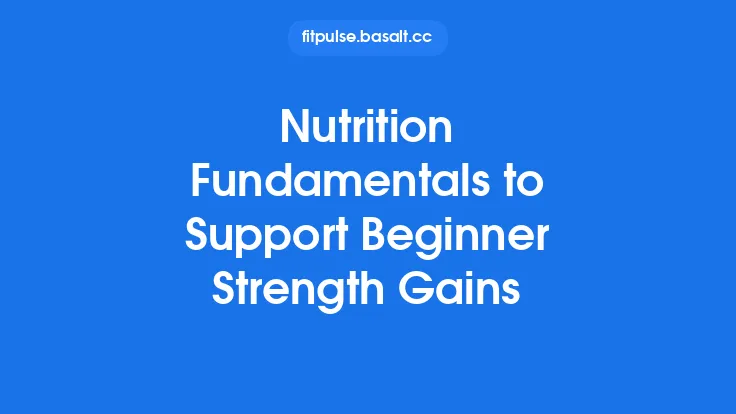Bodyweight training relies heavily on the fuel you provide your body. Whether you’re mastering a perfect push‑up in your twenties or maintaining functional strength in your seventies, the nutrients you consume dictate how well you can perform, recover, and stay injury‑free. Below is a comprehensive guide to the nutrition essentials that support bodyweight training at any age. The information is evergreen, meaning it remains relevant regardless of trends or fleeting diet fads, and it is organized to help you apply the principles to your daily routine.
Macronutrient Foundations
Protein: The Building Block of Muscle
- Why it matters: Protein supplies the amino acids needed for muscle protein synthesis (MPS), the process that repairs and builds muscle fibers after a workout.
- Recommended intake:
- General guideline: 1.2–2.0 g of protein per kilogram of body weight per day (0.55–0.9 g/lb).
- Higher end: Athletes or those in heavy training phases may benefit from 2.0 g/kg, especially when training multiple sessions per day.
- Quality matters: Prioritize complete proteins that contain all nine essential amino acids. Animal sources (lean meat, fish, eggs, dairy) are naturally complete, while plant sources (legumes, quinoa, soy) can be combined to achieve completeness.
- Leucine threshold: Consuming ~2–3 g of leucine per meal (found in whey, soy, or legumes) maximally stimulates MPS. This translates to roughly 20–30 g of high‑quality protein per serving.
Carbohydrates: Fuel for Performance
- Why they matter: Carbohydrates replenish glycogen stores in muscle and liver, providing the quick energy needed for high‑intensity bodyweight moves such as burpees, plyometric jumps, and circuit training.
- Recommended intake:
- Low‑to‑moderate intensity (e.g., yoga, light calisthenics): 3–5 g/kg/day.
- Moderate‑to‑high intensity (e.g., HIIT, advanced calisthenics): 5–7 g/kg/day.
- Very high volume or competition prep: 7–10 g/kg/day.
- Timing tip: Consuming 30–60 g of fast‑digesting carbs (e.g., fruit, rice, potatoes) within 30 minutes post‑workout accelerates glycogen resynthesis and supports recovery.
Fats: Hormonal Health and Energy Reservoir
- Why they matter: Dietary fats are essential for the production of hormones like testosterone and estrogen, which influence muscle growth, recovery, and overall well‑being. They also provide a dense energy source for longer, lower‑intensity sessions.
- Recommended intake: 0.8–1.0 g/kg/day, making up roughly 20–35 % of total daily calories.
- Focus on quality:
- Monounsaturated fats: Olive oil, avocados, nuts.
- Polyunsaturated fats: Fatty fish (EPA/DHA), flaxseeds, walnuts.
- Limit saturated fats to <10 % of total calories and avoid trans fats entirely.
Micronutrients and Their Role in Bodyweight Training
| Micronutrient | Primary Function for Calisthenics | Food Sources | Practical Tips |
|---|
| Vitamin D | Calcium absorption, muscle function, immune health | Sunlight, fortified dairy, fatty fish | Aim for 800–1000 IU/day; test serum levels if you train indoors year‑round |
| Calcium | Bone strength, muscle contraction | Dairy, fortified plant milks, leafy greens | 1000 mg (19‑50 yr), 1200 mg (51+ yr) daily |
| Magnesium | Energy production, muscle relaxation, sleep quality | Nuts, seeds, whole grains, dark chocolate | 310–420 mg/day; consider a bedtime supplement if cramps occur |
| Iron | Oxygen transport, fatigue resistance | Red meat, lentils, spinach, fortified cereals | Women of reproductive age: 18 mg/day; men: 8 mg/day |
| Zinc | Protein synthesis, immune support | Oysters, beef, pumpkin seeds | 8–11 mg/day; avoid excess (>40 mg) as it can impair copper absorption |
| B‑Vitamins (B6, B12, Folate) | Energy metabolism, red blood cell formation | Whole grains, legumes, eggs, meat | Ensure adequate intake, especially for vegans (B12 supplement) |
| Omega‑3 Fatty Acids | Anti‑inflammatory, joint health, cognitive function | Salmon, sardines, chia seeds, algae oil | 1–2 g EPA/DHA daily for joint comfort and recovery |
Hydration: The Often‑Overlooked Performance Pillar
- Baseline needs: 30–35 ml of water per kilogram of body weight daily (≈2–3 L for most adults).
- During training: Aim for 150–250 ml every 15–20 minutes, especially in hot or humid environments.
- Electrolytes: For sessions longer than 60 minutes, supplement with sodium (300–600 mg) and potassium (200–300 mg) to maintain fluid balance and prevent cramping.
- Post‑exercise: Rehydrate with a fluid volume equal to 150 % of the weight lost during the session (weigh yourself before and after training).
Meal Timing and Frequency
- Pre‑Workout (1–2 hours before):
- 20–30 g of protein + 30–50 g of carbs.
- Example: Greek yogurt with berries and a drizzle of honey, or a small chicken wrap with whole‑grain tortilla.
- During Workout (if >60 min):
- Light carbs (e.g., a banana or sports drink) to sustain blood glucose.
- Post‑Workout (within 30–60 minutes):
- 20–30 g of high‑quality protein + 30–60 g of carbs.
- Example: Whey protein shake with a banana, or a tofu stir‑fry with brown rice.
- Evening Meal (if training later in the day):
- Include a source of casein protein (e.g., cottage cheese) to provide a slow‑release amino acid supply overnight.
- Snack Strategy:
- Keep protein‑rich snacks (nuts, cheese sticks, boiled eggs) handy to meet daily protein targets without large meals.
Supplements: When and Why They Can Help
| Supplement | Evidence‑Based Benefit for Bodyweight Training | Recommended Dose | When to Use |
|---|
| Whey Protein | Rapidly increases MPS post‑exercise | 20–30 g per serving | Post‑workout or when whole‑food protein is insufficient |
| Creatine Monohydrate | Improves strength, power, and muscle volumization | 3–5 g daily (maintenance) | Daily, regardless of training day |
| Beta‑Alanine | Buffers acid in muscles, enhancing high‑intensity performance | 2–5 g daily (split doses) | For sessions with many explosive moves |
| Vitamin D3 | Supports bone health and muscle function | 800–2000 IU daily (based on serum levels) | Year‑round, especially in low‑sunlight climates |
| Fish Oil (EPA/DHA) | Reduces inflammation, aids joint health | 1–2 g EPA/DHA daily | Daily, especially for older adults |
| Electrolyte Powders | Maintains fluid balance during long sessions | Follow label (usually 300 mg Na, 150 mg K per serving) | During/after prolonged workouts |
| Multivitamin | Fills minor gaps in micronutrient intake | As per label | If diet lacks variety |
*Note:* Supplements are adjuncts, not replacements for a balanced diet. Always consult a healthcare professional before beginning any new supplement regimen, especially if you have pre‑existing medical conditions.
Age‑Specific Nutritional Nuances (Evergreen Principles)
Youth (up to ~18 years)
- Growth priority: Adequate calories and protein are essential for skeletal development and hormonal balance.
- Calcium & Vitamin D: Emphasize dairy or fortified alternatives to support peak bone mass.
- Avoid restrictive diets: Ensure a varied diet to meet the higher micronutrient demands of growth.
Young Adults (19‑35 years)
- Metabolic flexibility: This group can handle a broader range of macronutrient ratios, making it easier to experiment with periodized nutrition (e.g., carb cycling).
- Recovery focus: Incorporate anti‑inflammatory foods (berries, turmeric, omega‑3s) to mitigate training‑induced soreness.
Mid‑Life Adults (36‑55 years)
- Hormonal shifts: Slight declines in testosterone and estrogen can be mitigated with sufficient dietary fats and zinc.
- Joint health: Prioritize omega‑3s, collagen‑rich foods (bone broth, gelatin), and adequate vitamin C for collagen synthesis.
- Metabolic slowdown: Slightly reduce total caloric intake while maintaining protein to preserve lean mass.
Seniors (56 years+)
- Protein timing: Distribute protein evenly across 3–4 meals to overcome anabolic resistance. Aim for 1.2–1.5 g/kg/day.
- Vitamin D & Calcium: Critical for preventing osteoporosis; consider supplementation if dietary intake is low.
- Hydration vigilance: Thirst perception diminishes with age; schedule regular fluid intake.
- Digestibility: Choose easily digestible protein sources (e.g., whey, soft-cooked eggs) and incorporate fiber‑rich foods to support gut health.
Practical Meal‑Planning Strategies
- Batch‑Cook Core Staples:
- Cook a large pot of quinoa or brown rice, grill chicken or tofu, and roast a tray of mixed vegetables. Portion into containers for quick assembly.
- Use the “Plate Method”:
- Half the plate: non‑starchy vegetables.
- Quarter: lean protein.
- Quarter: complex carbs (sweet potatoes, whole grains).
- Smart Grocery List:
- Proteins: eggs, Greek yogurt, canned beans, lean meats, tempeh.
- Carbs: oats, whole‑grain bread, fruit, legumes.
- Fats: nuts, seeds, olive oil, avocado.
- Micronutrient Boosters: leafy greens, colorful peppers, berries, fortified plant milks.
- Prep Snacks Ahead:
- Portion nuts into zip‑lock bags, pre‑wash fruit, make protein bars or energy balls with oats, nut butter, and whey.
- Track, Then Adjust:
- Use a simple app or journal to log protein, carbs, fats, and total calories for a week. Adjust portions until you consistently meet your targets.
Common Pitfalls and How to Avoid Them
| Pitfall | Why It Happens | Solution |
|---|
| Undereating for “lean” look | Misconception that lower calories always equal better definition. | Prioritize protein and maintain a modest calorie deficit (≈10–15 %). Use body composition measurements rather than the scale alone. |
| Over‑reliance on “quick‑fix” diets | Trendy low‑carb or high‑fat plans can neglect micronutrients. | Adopt a balanced, whole‑food approach; treat any diet as a temporary tool, not a permanent lifestyle. |
| Skipping post‑workout nutrition | Belief that “the window” is not important. | Aim for protein + carbs within 30–60 minutes; even a simple shake or fruit‑yogurt combo works. |
| Neglecting hydration | Forgetting to drink when not thirsty. | Set reminders, carry a water bottle, and monitor urine color (pale yellow is ideal). |
| Ignoring sleep and stress | Focus solely on food and training. | Sleep 7–9 hours/night; manage stress with breathing, meditation, or light mobility work, as cortisol can impair recovery. |
Putting It All Together: A Sample Day for a 35‑Year‑Old Bodyweight Enthusiast
| Time | Meal | Approx. Nutrients |
|---|
| 07:00 | Breakfast – 3 scrambled eggs, 1 cup sautéed spinach, 1 slice whole‑grain toast, 1 orange | 30 g protein, 45 g carbs, 15 g fat |
| 10:00 | Snack – Greek yogurt (200 g) + 1 tbsp honey + ¼ cup granola | 20 g protein, 30 g carbs, 5 g fat |
| 12:30 | Pre‑Workout Lunch – Grilled chicken breast (120 g), quinoa (½ cup cooked), mixed veggies, drizzle of olive oil | 35 g protein, 45 g carbs, 12 g fat |
| 14:00 | Training – 45‑minute calisthenics circuit (push‑ups, pull‑ups, pistol squats, burpees) |
| 14:30 | Post‑Workout Shake – Whey protein (30 g) + banana + water | 30 g protein, 30 g carbs |
| 16:30 | Snack – Handful almonds + an apple | 6 g protein, 25 g carbs, 15 g fat |
| 19:00 | Dinner – Baked salmon (150 g), sweet potato (200 g), steamed broccoli, side salad with avocado | 35 g protein, 50 g carbs, 20 g fat |
| 21:30 | Evening Snack – Cottage cheese (½ cup) + berries | 15 g protein, 10 g carbs, 2 g fat |
| Total | ≈ 191 g protein, 235 g carbs, 79 g fat (≈ 2,300 kcal) – aligns with 1.6 g/kg protein for a 70 kg individual and provides sufficient carbs for glycogen replenishment. |
Bottom Line
Nutrition is the silent partner that determines how effectively you can train, recover, and stay healthy throughout life. By mastering the fundamentals—adequate protein, strategic carbohydrate timing, healthy fats, essential micronutrients, and proper hydration—you create a solid platform for bodyweight training at any age. Tailor the specifics to your life stage, listen to your body, and keep the focus on balanced, whole‑food choices. With these evergreen principles in place, you’ll be equipped to progress confidently, whether you’re mastering your first pull‑up or maintaining functional strength well into your golden years.





